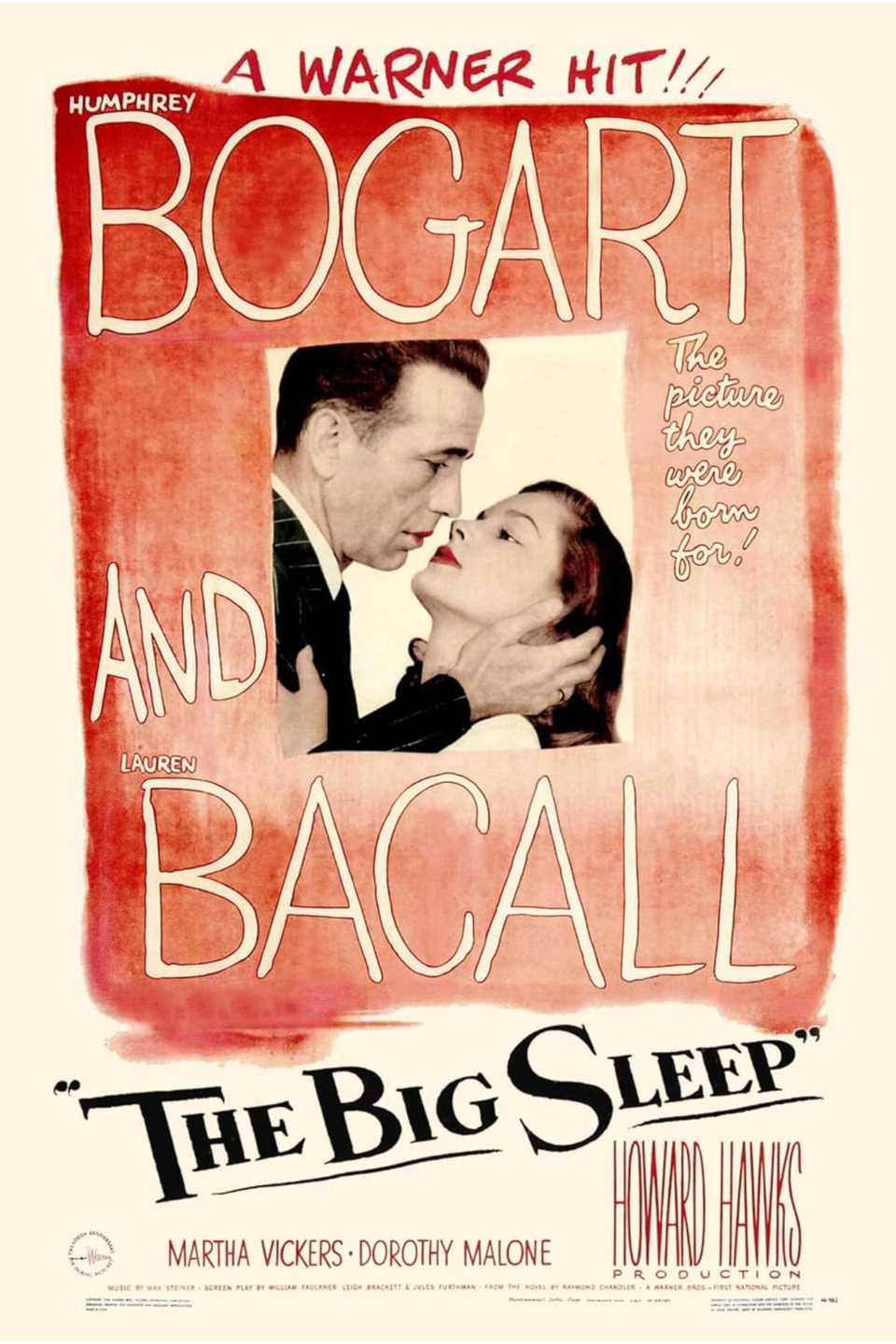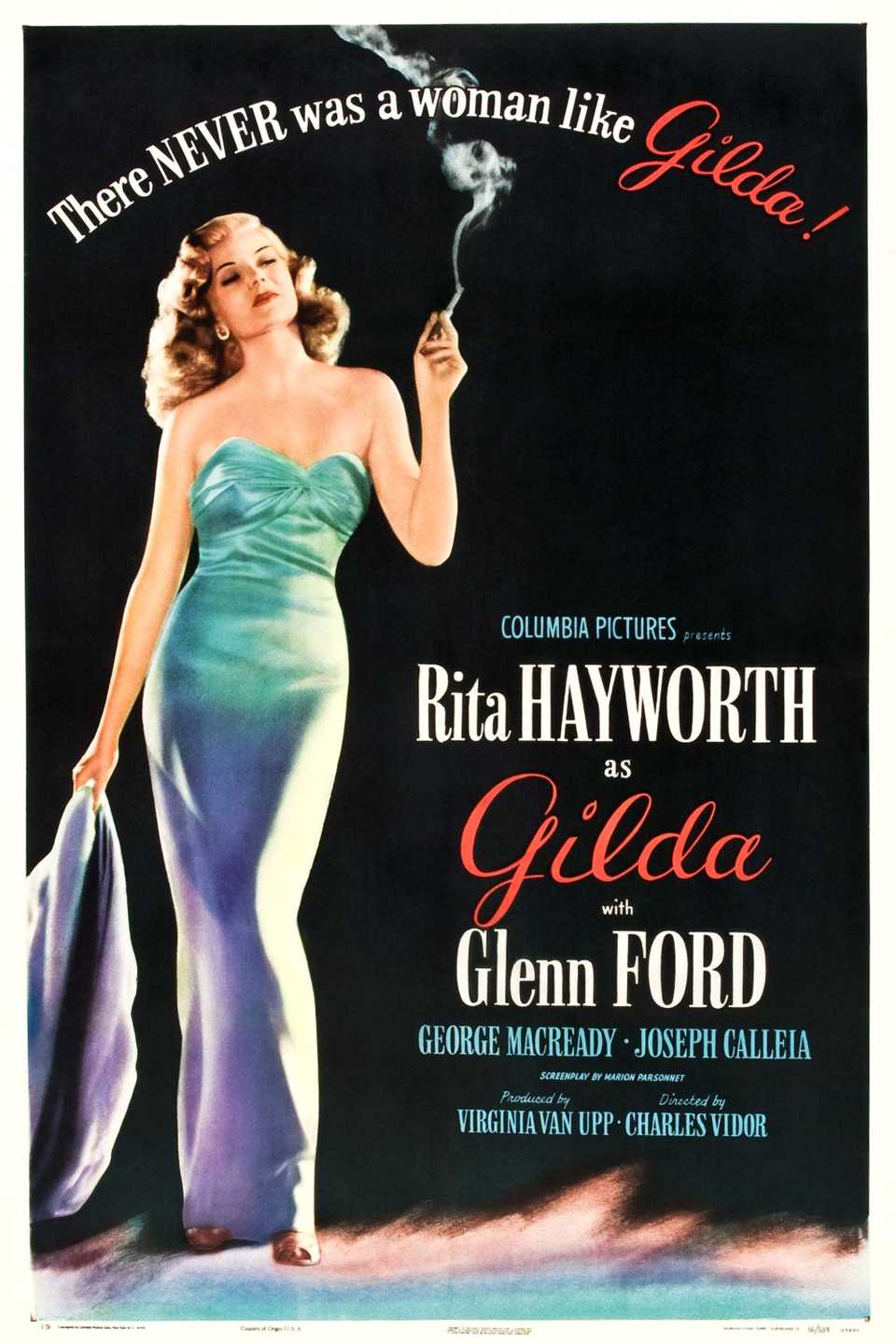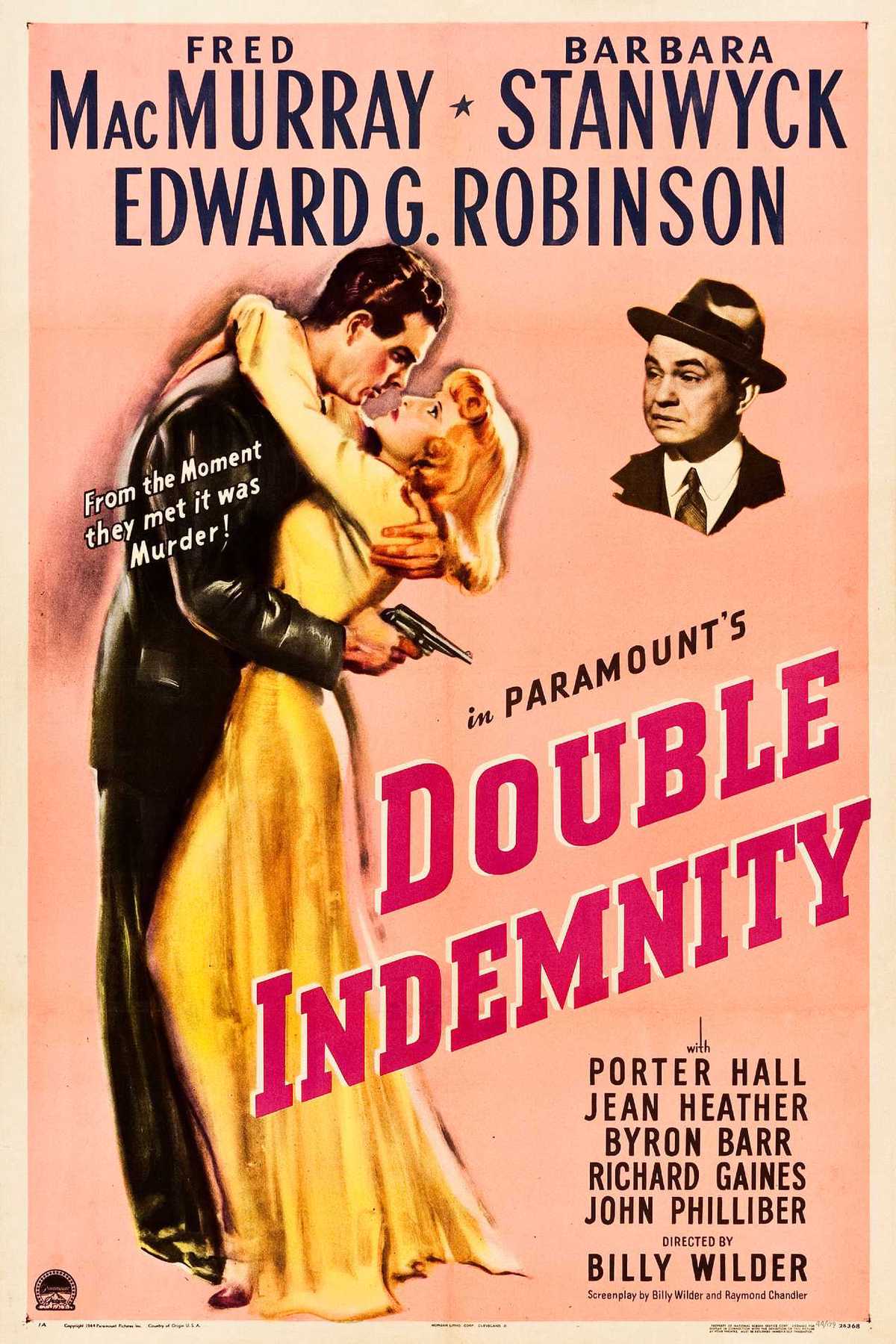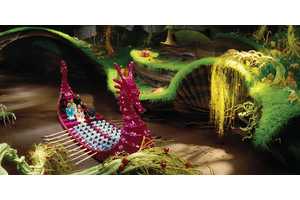10 Film Noir Movies That Defined The Genre
In film noir, almost nothing is as it seems, and the lines between right and wrong are never quite clear. The legendary genre of crime dramas took over 1940s cinema, introducing a blend of mystery, suspense, and subtle romance that made a lasting mark on the silver screen. However, it’s never actually been just about crime. The art of film noir lies in its game of shadows, tension, and the unavoidable moral puzzles that leave the viewer questioning everything and everyone they see.
From Double Indemnity to The Third Man, film noir has produced some of the best movies of all time. Packed with iconic performances, sharp dialogue, and unforgettable visuals, these are timeless black-and-white movies that still hold up today. Their legacy continues to echo in modern filmmaking, no matter how quietly, reminding audiences what Hollywood was really built on.
10 Double Indemnity (1944)
Directed by Billy Wilder

Double Indemnity
- Release Date
- July 3, 1944
- Runtime
- 107 Minutes
- Director
- Billy Wilder
- Writers
- Billy Wilder, Raymond Chandler
Cast
 Fred MacMurray
Fred MacMurray Barbara Stanwyck
Barbara Stanwyck
Double Indemnity is a 1944 crime thriller directed by Billy Wilder. An insurance salesman is dragged into a web of lies by a housewife who recently lost her husband and remains the lead suspect in his death. However, the deeper the salesman falls for her charms, the more his co-worker, an insurance claims investigator, begins to suspect foul play.
- Studio(s)
- Paramount Pictures
- Distributor(s)
- Paramount Pictures
In addition to being one of Billy Wilder’s best movies, Double Indemnity stands out as the ultimate noir classic that every film buff should see at least once in their movie-watching journey. It’s not just a film, but instead, a masterclass in cinematic cool, where every twist and turn feels like a dive into the shadows of the human soul. The story is dark, twisted, and morally questionable.
Title | IMDb Score |
|---|---|
Double Indemnity | 8.3 / 10 |
It follows insurance salesman Walter Neff (played by Fred MacMurray), who gets tangled in a murder plot with the sultry and manipulative Phyllis Dietrichson (Barbara Stanwyck). As the layers peel away, it becomes clear that Walter is in way over his head and that Phyllis might have a lot more in mind than just her husband’s death. From its iconic shots and unforgettable characters to the razor-sharp dialogue and dark themes, it’s easy to see why Double Indemnity is the godfather of noir.
9 Sunset Boulevard (1950)
Directed by Billy Wilder

Your comment has not been saved
Sunset Boulevard
- Release Date
- August 10, 1950
- Runtime
- 110 Minutes
- Director
- Billy Wilder
- Writers
- Charles Brackett, Billy Wilder, D.M. Marshman Jr.
Cast
 William HoldenJoe Gillis
William HoldenJoe Gillis Gloria SwansonNorma Desmond
Gloria SwansonNorma Desmond
- Main Genre
- Film Noir
If classic Hollywood had a dark, distorted love letter to itself, it would be Sunset Boulevard. It’s somewhat of a haunting fever dream that dissects fame, obsession, and the rotting underbelly of Hollywood’s golden age, which might be the reason this Hollywood satire is Clint Eastwood’s favorite movie. Notably, in an era of social media influencers and viral fame, the 1950 title feels more relevant than ever.
Our guide through this noir nightmare is Joe Gillis (William Holden), a struggling screenwriter, who stumbles into the decaying mansion of Norma Desmond (Gloria Swanson), a faded silent film star obsessed with a comeback. Together, they spiral into a web of toxic delusion. The thing is, Swanson was once a real-life silent movie star herself, just like her character, making her performance all the more eerie. This movie blurred reality and fiction in ways that no other noir dared, reminding us that no dream factory is ever without its nightmares.
8 The Maltese Falcon (1941)
Directed by John Huston

Your comment has not been saved
The Maltese Falcon
- Release Date
- October 18, 1941
- Runtime
- 100 minutes
- Director
- John Huston
- Writers
- John Huston
Cast
 Humphrey BogartSamuel Spade
Humphrey BogartSamuel Spade Mary AstorBrigid O'Shaughnessy
Mary AstorBrigid O'Shaughnessy
The Maltese Falcon, released in 1941, features private detective Sam Spade as he becomes entangled with three eccentric criminals and a deceitful woman in a pursuit of a priceless statuette. Starring Humphrey Bogart, this film has become a quintessential example of the film noir genre.
- Main Genre
- Mystery
Not only does The Maltese Falcon define film noir, but it basically created it. It delivers everything one could ask for from a noir title, including shadow-drenched cinematography, morally gray characters, snappy dialogue, and a world where trust is a fool’s game. More than eight decades after its release, John Huston’s 1941 classic holds up as a slick, sharp, and endlessly watchable movie that never loses its bite.
The Maltese Falcon is infinitely quotable, dripping with style, and its characters set the noir standards of today. The cynical, hard-boiled detective who’s always two steps ahead of everyone, the femme fatale with a degree in master manipulation, and a colorful lineup of villains is all here, giving birth to a truly unforgettable story. Notably, this Humphrey Bogart-led movie has a 99% Rotten Tomatoes score and an underrated sequel on Netflix, so waste no time before adding it to the must-watch list.
7 Laura (1944)
Directed by Otto Preminger

Your comment has not been saved
Laura
- Release Date
- October 11, 1944
- Runtime
- 88 Minutes
- Director
- Otto Preminger, Rouben Mamoulian
- Writers
- Vera Caspary, Jay Dratler, Samuel Hoffenstein, Elizabeth Reinhardt
Cast
 Gene TierneyLAura Hunt
Gene TierneyLAura Hunt Dana AndrewsDet. Lt. Mark McPherson
Dana AndrewsDet. Lt. Mark McPherson
Released in 1944, Laura is a film noir directed by Otto Preminger. The story follows detective Mark McPherson, portrayed by Dana Andrews, as he investigates the murder of a beautiful and successful advertising executive named Laura Hunt, played by Gene Tierney. The film delves into themes of obsession and deception, featuring a memorable cast that includes Clifton Webb, Vincent Price, and Judith Anderson.
- Main Genre
- Film Noir
While dedicated noir fans certainly recognize Laura, it remains one of the most completely underrated crime movies among today’s mainstream film audiences. The story is about the murder investigation of Laura Hunt (Gene Tierney), a stunning advertising executive who was found shot in her apartment. As detective Mark McPherson (Dana Andrews) digs through her past, he starts falling for her.
According to Clifton Webb, who plays Waldo Lydecker, the snobbish columnist who took Laura under his wing, the movie took ten weeks to film and had a particularly grueling schedule.
Laura is a more stylish take on the noir genre, but its elegance should not be mistaken for weakness. It’s a psychological maze wrapped in soft lighting, quick-witted dialogue, and a mystery that keeps unraveling until the very last frame. Blending crime drama, psychological noir, and eerie romance, it remains one of the most distinctive films of both its era and in general. In short, Laura isn’t just about uncovering the truth behind a murder, but about unraveling the enigma of why everyone was so obsessed with Laura to begin with.
6 The Big Sleep (1946)
Directed by Howard Hawks

Your comment has not been saved
The Big Sleep
- Release Date
- August 31, 1946
- Runtime
- 114 Minutes
- Director
- Howard Hawks
- Writers
- William Faulkner, Leigh Brackett, Jules Furthman, Raymond Chandler
Cast
 Humphrey Bogart
Humphrey Bogart Lauren Bacall
Lauren Bacall
The Big Sleep is a 1946 film noir directed by Howard Hawks, featuring Humphrey Bogart as private detective Philip Marlowe. Based on Raymond Chandler's novel, the film follows Marlowe as he investigates the blackmail of a wealthy family's daughter, uncovering a web of crime and intrigue. Lauren Bacall co-stars as Vivian Rutledge, adding to the film's electric atmosphere and complex narrative.
- Main Genre
- Film Noir
Starring Humphrey Bogart, The Big Sleep is undoubtedly the best Phillip Marlowe movie to date. The Hollywood legend effortlessly brought the iconic private eye to life, balancing charm with a simmering darkness underneath. Directed by Howard Hawks and adapted from Raymond Chandler’s eponymous novel, The Big Sleep still holds up as one of the defining examples of film noir.
When a wealthy businessman hires Marlowe to investigate his daughters' blackmail, the detective soon finds himself tangled in shady dealings, deadly secrets, and a mysterious femme fatale. The twisted world of The Big Sleep doesn’t care whether anyone can keep up, dragging both Marlowe and the audience deeper into its chaos until they’re as lost as the hero. Despite its looming sense of doom, or perhaps because of it, the 1946 title keeps you hooked, proving the best mysteries are often the ones that don’t make sense.
5 Out Of The Past (1947)
Directed by Jacques Tourneur

Your comment has not been saved
Out Of The Past
- Release Date
- November 25, 1947
- Runtime
- 97 Minutes
- Director
- Jacques Tourneur
- Writers
- Daniel Mainwaring
Cast
 Robert Mitchum
Robert Mitchum Jane Greer
Jane Greer
Jeff Bailey, a seemingly ordinary gas station owner, is pulled back into a dark and dangerous past when a former associate arrives with a message from a powerful crime boss, Whit Sterling. Flashbacks reveal Jeff's former life as a private detective, hired by Whit to locate his elusive mistress, Kathie Moffat. Jeff finds Kathie in Mexico, and they fall in love, but their happiness is short-lived as deception and betrayal ensue.
- Main Genre
- Crime
- Studio(s)
- RKO Radio Pictures
- Distributor(s)
- RKO Radio Pictures
For anyone who wants to know what film noir feels like, look no further than Out of the Past. Directed by Jacques Tourneur, this movie is a masterclass in the genre. With moody lighting, complex characters, a twisted plot, and a devastating ending, it's a timeless classic that still manages to surprise.
The movie revolves around Jeff Bailey (Robert Mitchum), a former private detective turned gas station owner trying to escape the shadows of his past. In true noir fashion, a beautiful and mysterious woman drags him back into a world of crime, deceit, and betrayal. The story unfolds in layers, with flashbacks giving us glimpses into Jeff’s past life. It’s essentially a plot within a plot, with each twist and turn revealing just enough to make you rethink what you thought you knew. Out of the Past oozes noir at its finest, truly capturing the essence of suspense.
4 Touch Of Evil (1958)
Directed by Orson Welles

Your comment has not been saved
Touch of Evil
- Release Date
- April 23, 1958
- Runtime
- 111 Minutes
- Director
- Orson Welles
Cast
 Charlton Heston
Charlton Heston Janet Leigh
Janet Leigh
After a car bomb detonates at the U.S./Mexico border, Mexican agent Miguel Vargas and American captain Hank Quinlan investigate. As Vargas uncovers corruption within Quinlan's team, his pursuit of justice jeopardizes his safety and his wife's, in this tense thriller.
One of Orson Welles’ best movies, in terms of both directing and acting, Touch of Evil is a title that doesn’t ask the viewer to sit back and relax. Instead, it demands full attention as it takes you on a wild, unrelenting ride into a world of corruption, moral decay, and distorted justice. With one of the most iconic opening scenes in the history of cinema, it pulls the viewer straight into action.
Title | IMDb Score |
|---|---|
Touch of Evil | 7.9 / 10 |
From there, Touch of Evil spirals into a web of deception in a gritty border town in Texas, with every character hiding secrets and no one being who they appear. The film is full of long takes, unsettling angles, and extreme close-ups, emphasizing the paranoia and madness of its quintessentially noir characters. The entire thing leaves you feeling unsettled, unsure of whom to trust, and questioning whether anyone in the film can escape the system they’re trapped in.
3 Gilda (1946)
Directed by Charles Vidor

Your comment has not been saved
Gilda
- Release Date
- April 25, 1946
- Runtime
- 110 Minutes
- Director
- Charles Vidor
- Writers
- Marion Parsonnet
Cast
 Rita Hayworth
Rita Hayworth Glenn Ford
Glenn Ford George Macready
George Macready Joseph Calleia
Joseph Calleia
In post-war Buenos Aires, Johnny Farrell's loyalty to casino owner Ballin Mundson is tested when Mundson's new wife, Gilda, is revealed to be Johnny's former lover. As tensions rise, secrets and betrayals unfold, leading to a dramatic climax filled with passion, jealousy, and revenge.
- Main Genre
- Romance
- Studio(s)
- Columbia Pictures
Some noir films are remembered for their cynical detectives, gritty crimes, and shocking twists, but Gilda endures because of its emotions, which are messy, raw, and all-consuming. Directed by Charles Vidor and starring Rita Hayworth in one of her best roles, the movie centers around the toxic love triangle between Johnny Farrell (Glenn Ford), Ballin Mundson (George Macready), and Gilda (Hayworth).
2 Kiss Me Deadly (1955)
Directed by Robert Aldrich

Your comment has not been saved
Kiss Me Deadly
- Release Date
- May 18, 1955
- Runtime
- 106 Minutes
- Director
- Robert Aldrich
- Writers
- A.I. Bezzerides
Cast
 Ralph Meeker
Ralph Meeker Albert Dekker
Albert Dekker Paul Stewart
Paul Stewart Juano Hernandez
Juano Hernandez
Kiss Me Deadly is a 1955 film noir based on Mickey Spillane's novel, directed by Robert Aldrich. Ralph Meeker stars as private detective Mike Hammer, who becomes embroiled in a sinister conspiracy involving a mysterious and dangerous briefcase. The film is noted for its hard-edged storytelling and visual style, capturing the paranoia and atomic age anxieties of the 1950s.
- Studio(s)
- Parklane Pictures
- Distributor(s)
- United Artists
If classic film noir is a slow burn, Kiss Me Deadly is a ticking time bomb. This brutal, nightmarish take on Mickey Spillane’s novel of the same name pushes the genre into a new, scarier era. It’s raw, violent, and unrelenting, dripping with Cold War paranoia and a sense of doom that lingers long after its shocking ending.
Visually, Kiss Me Deadly is a masterpiece. Every scene feels tense and disorienting, immersing the viewer into Hammer’s growing chaos.
The story introduces us to Mike Hammer (Ralph Meeker), who isn’t the usual noir antihero. He’s rougher, meaner, and plays dirtier, which he isn’t shy to use to his advantage. However, the deeper he digs, the clearer it becomes that he’s way out of his depth. Visually, Kiss Me Deadly is a masterpiece. Every scene feels tense and disorienting, immersing the viewer into Hammer’s growing chaos. It’s one of the best film noir movies about revenge, influencing everything from Chinatown to Pulp Fiction.
1 The Third Man (1949)
Directed by Carol Reed

Your comment has not been saved
Set in post-World War II Vienna, The Third Man follows Holly Martins, a writer who travels to the city and becomes embroiled in a mystery surrounding his friend Harry Lime's suspicious death. Directed by Carol Reed and featuring Orson Welles and Joseph Cotten, the film blends elements of noir and thriller genres, exploring themes of deception and morality against a backdrop of a war-torn city.
- Director
- Carol Reed
- Writers
- Graham Greene, Orson Welles, Alexander Korda
- Main Genre
- Noir
- Studio(s)
- London Film Productions
- Distributor(s)
- Selznick Releasing Organization
The Third Man is the kind of movie that makes one wonder why they don’t make them like that anymore. It’s a film that’s as iconic as they come in the noir genre, and for good reason. The story kicks off with Holly Martins (Joseph Cotten), a struggling American writer who arrives in Vienna to visit his old friend Harry Lime (Orson Welles), only to discover that Lime has died under mysterious circumstances. As Martins digs deeper, he realizes that nothing and no one are what they seem.
Known for its innovative cinematography, The Third Man masterfully plays with contrasting light to heighten paranoia, all set against an eerie black-and-white post-war Europe (it doesn't get better than the iconic chase through the sewers). This 1949 classic is a blueprint for how to tell a suspenseful, morally complex tale, making it not just a standout noir film but a great movie overall.










Your comment has not been saved